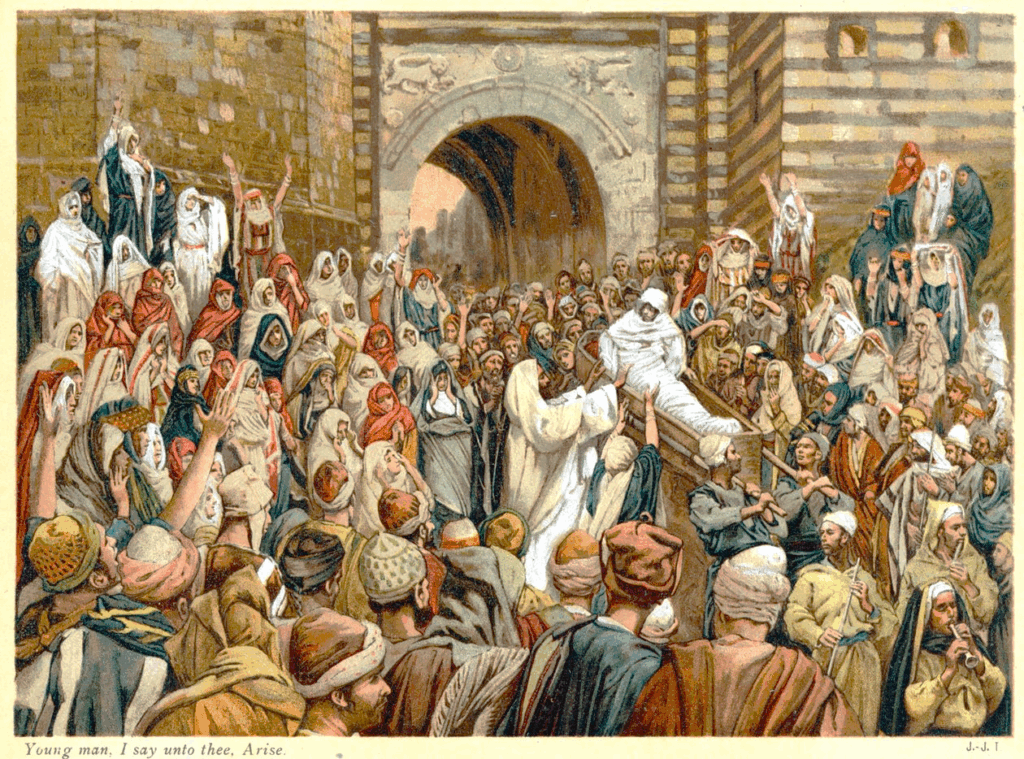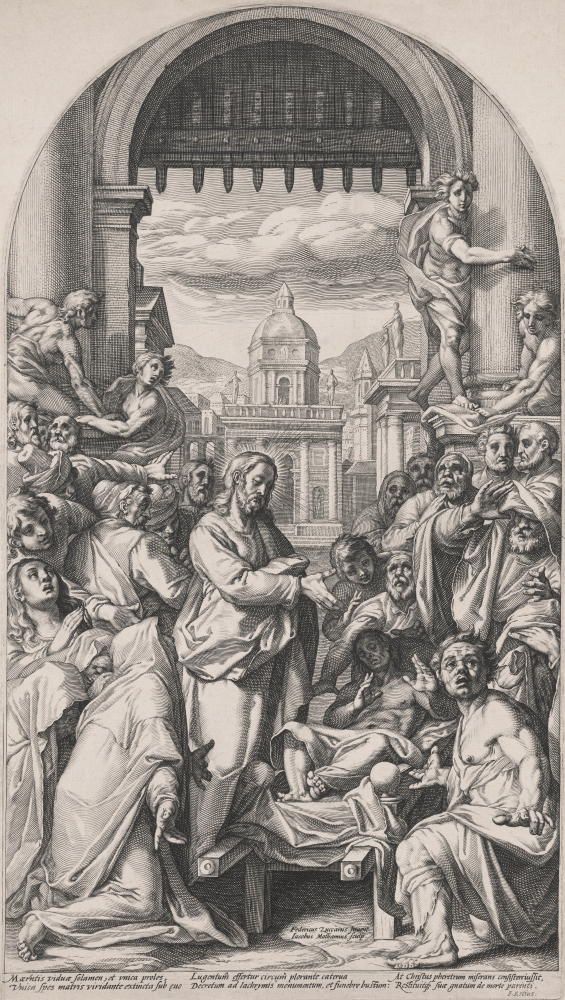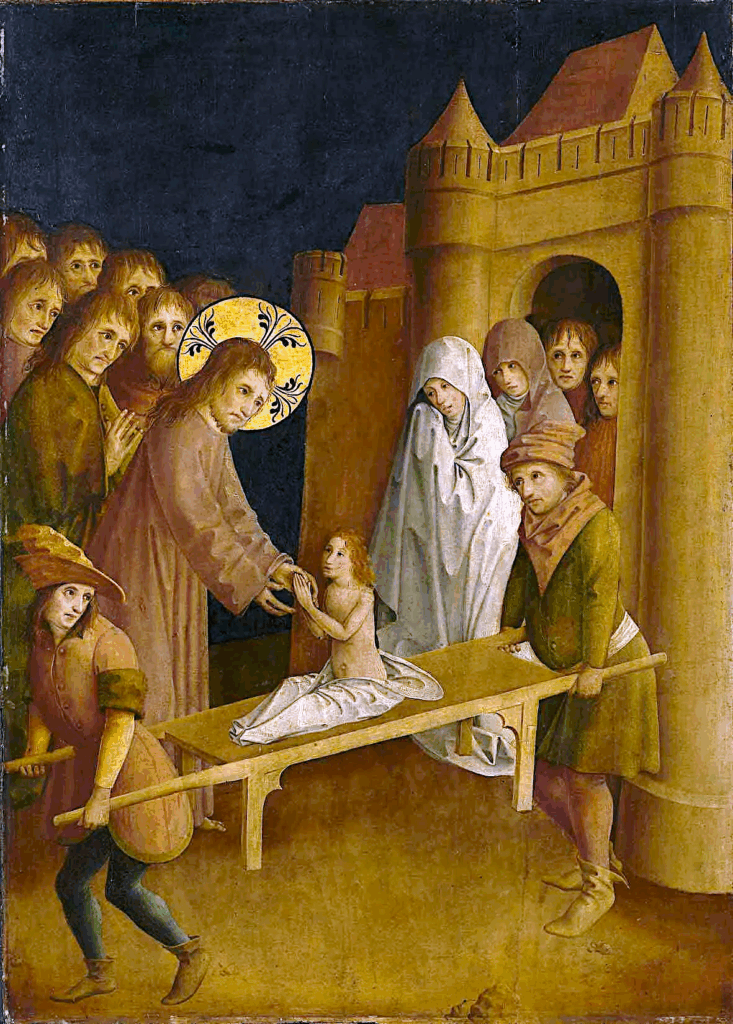Translation From the Gospel According to Luke (7:11-16)
At that time, Jesus went into a city called Naim: and there went with Him His disciples, and a great multitude. And when He came nigh to the gate of the city, behold a dead man was carried out, the only son of his mother, and she was a widow, and a great multitude of the city were with her. And when the Lord had seen her, He had compassion on her, and said to her: Weep not. And He came near and touched the bier. And they that carried it stood still. And He said: Young man, I say to thee, Arise. And he that was dead, sat up, and began to speak. And He delivered him to his mother. And there came a fear on them all: and they glorified God, saying: A great prophet is risen up among us, and God has visited His people.
A Message From St. Anthony of Padua’s Sermons: “XVI Sunday After Pentecost”
(How mortal sin is recognised: In each of us.)
Let us say, then:
Jesus went into a city that is called Naim; and there went with him his disciples and a great multitude. And when he came nigh the gate of the city, behold, a dead man was carried out, the only son of his mother; and she was a widow. And a great multitude of the city was with her (Luke 7:11-12).
The Gloss briefly summarises this Gospel thus: “When the Word-made-flesh was leading the Gentile people through the gates of faith to the heavenly Jerusalem, behold, the younger Jewish people which was dead through lack of faith was being carried out. Mother Church owned that people as her own in the world, and accompanied by many crowds of peoples wept with loving affection and laboured to recall it to life with devout tears. She obtains this both in the few Jews who are converted at the moment, and the fullness in the end.” “The bier that is carried out is the human body; the bearers are evil habits, which drag that body towards death. But Jesus touches the bier when he raises our frail nature upon the wood of the Cross; then the bearers stand still, because they are unable to drag to death as they did before. Then Jesus speaks, imparting his saving counsel, and when he hears the word the dead man returns to life and is restored to his mother by good deeds.”
… There are three things to notice particularly in the Gospel: the city of Naim, the widow’s son who was dead there, and the widow herself. … The Lord, moved to mercy by the widow’s prayers, raised her son to life. What all these things mean from a moral point of view, let us see.
The city of Naim… means ‘movement’, or ‘tossing of the waves’.. It represents our body, disturbed by instinctive movements, the waves of evil thoughts, the sorrow of tribulation, the groans and tears of childbirth. We will treat of these four things.
Note that “in each of us nothing else takes place when anyone falls into sin, than happened in those three, to whit the serpent, the woman and the man. First comes temptation, either by thought or by bodily sense. When this suggestion is made, if our desire is not moved to sin, the serpent’s guile is thwarted. But if it is moved, it is as when the woman was beguiled. Sometimes, reason acts firmly and restrains and curbs the desire that has been aroused. When that happens, we do not fall into sin, but with some struggle we are crowned. But if reason consents, and decides to carry out what lust is urging, man is cast out from all life’s happiness, as though from paradise. He is already guilty of sin, even if the deed does not follow, because guilt is reckoned to lie in the consent of the will.” A further enquiry is needed to distinguish mortal and venial sin in the soul. “If sin is not long held with pleasurable thought, but as soon as the sensual motion touches the woman (the lower part of reason) it is driven of by the authority of the man (reason), it is venial.” “And so pardon is to be sought for such thoughts, and we should beat our breasts and say: Forgive us our debts, as we also forgive our debtors (Matt 6:12)” “But if even thought alone should dwell for long on unlawful pleasures, from which it should turn away at once, even without deciding to do evil, but only thinking about them and taking pleasure therein, it is a mortal sin; and if it is not repented, a man will be damned.”
…
When Adam was cast out of paradise, he found the thorns of sorrow in his heart, and the thistles of tribulation in his body; as was said: Thorns and thistles shall it bring forth to thee (Gen 3:18).
Thorns pierce, as sharp as spears; thistles are troublesome weeds. The thorns of sorrow pierce the mind, while the thistles of tribulation trouble the body, so that it brings forth tears and groans. There you have the city of Naim, there is the city of Bethulia, where the only son dies and the people are afflicted. The son and the people stand for the human soul, which is afflicted by the temptation and assault of unseen enemies. When it surrenders to them, it dies miserably in its very body. So we must say: Behold, a dead man was carried out, the only son of his mother.
A dead man has fulfilled the business of life, ended life itself; he is ‘defunct’, having ceased or ended his function. The dead man who is carried out of the gate in the presence of a crowd represents a wicked sinner who does not hide his sin in the chamber of his heart, but flaunts it by word and deed, as by the gates of his soul’s city, in the sight of others. The gate whereby the dead man is carried out is any of the senses whereby someone falls into sin, and principally the sense of sight. By these portals, we import and export. By the eyes, we go out to look at the women of the country (cf. Gen 34:1), false delights; and by them death enters to kill our virtues.
(The four gates of our body.)
Note that the city of Naim (our body) has four gates- east, west, south and north- whereby the dead soul may be carried out. To prevent it from being carried out, the gates should be strengthened with bolts and guards.
…
(On sight: As the east to the world.)
The east stands for sight, because the eyes light up the whole body, as the east does to the world.
…
Whoever perseveres to the end in the Lord will truly rejoice, because he will pass to the tabernacle of eternal reward. If these three, namely the regality of the soul, the hope of eternal reward, and unshakeable perseverance to t
…
There are three things that hinder our hearing- words of pride, of detraction and of flattery. Against words of pride, be ready by humility and patience. “Patience is the best way of overcoming”, says a Philosopher. Against detractors, be one who hears sorrow and sadness; as Solomon says in Proverbs:
The north wind driveth away rain, as doth a sad countenance a backbiting tongue. (Pro 25:23)
You will be girded against flatterers if you remember your own wickedness, believing the testimony of your own conscience more than another’s tongue.
(On taste: The west is called, and on the nature of serpents.)
The west stands for taste… We sin in three ways by our tongue: by flattery, by detraction, and by taking more food and drink than we need. We flatter people to their faces, speak against them behind their backs, are slaves to the pleasures of gluttony.
…
Do you want to grow to God rather than to men? Give all glory and praise to the Creator, not to the creature. Do you want to avoid detraction? Forget every grudge and envy of heart. When you speak, say nothing but good of those who are absent. Any absentee whom you do not truly and purely love, I beg you, brother: forget when you speak.
…
(On touch: The north is called.)
The north represents touch. The north wind freezes the waters, and in the same way wickedness freezes the hands, so that they cannot stretch forth to good works…. We sin by the touch of our hands in three ways, by indecent and shameful touching, by taking what belongs to others, and by failing to give their rights to the poor. Against the first, judge yourself; against the second, be content with what is justly yours: … Against the third, enlarge yourself; stretch out your hand to the poor, to receive double from the hand of Jesus Christ.
If the gates of your body are defended with these bolts and guards, the dead man will not be carried out by the gates of the city of Naim.
…
Let us humbly pray him, then, dearest brothers, to strengthen the gates of our city with the aforesaid guards, and keep the fountain of living water, lest it be cut off by the devil; and may he dwell in our hearts, so that we may be found fit to dwell with him in heaven. May he grant this, who is blessed for ever. Amen.



